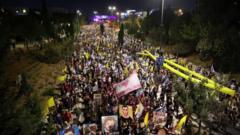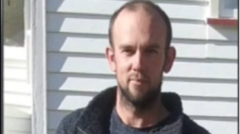Will Netanyahu Agree to a Hostage Deal Amid Thousands in Jerusalem?

Published: 2025-09-07 12:45:11 | Category: world
In recent weeks, protests have surged across Israel as more than 15,000 demonstrators have taken to the streets, demanding an end to the ongoing war in Gaza and urging Prime Minister Benjamin Netanyahu to negotiate the release of hostages held by Hamas. The conflict, which escalated significantly following the Hamas attack on 7 October 2023, has resulted in a staggering loss of life and has raised urgent questions about the humanitarian crisis unfolding in Gaza.
Last updated: 12 October 2023 (BST)
Key Takeaways
- Over 15,000 people protested in Israel, calling for a ceasefire and hostage negotiations.
- Of the 48 hostages still in Gaza, it is believed that 20 are alive.
- The death toll in Gaza has reportedly exceeded 64,000, with ongoing military operations by the Israeli Defence Forces (IDF).
- International pressure is mounting on Israel to halt military offensives and return to ceasefire discussions.
- Netanyahu remains committed to military victory over Hamas, despite growing concerns about the humanitarian consequences.
The Background of the Conflict
The ongoing conflict between Israel and Hamas has roots that extend far beyond recent events. On 7 October 2023, Hamas launched a deadly attack on southern Israel, resulting in approximately 1,200 deaths and the abduction of 251 individuals, who were taken back to Gaza. This event marked a significant escalation in hostilities and prompted Israel to initiate a large-scale military response aimed at dismantling Hamas's operational capabilities.
Casualties and Humanitarian Crisis
As the military offensive continues, the humanitarian situation in Gaza has deteriorated dramatically. The Hamas-run health ministry has reported that over 64,368 Palestinians have died as a result of the conflict. This figure has been contested by Israeli authorities, who argue that it may not accurately reflect the true situation on the ground. Nevertheless, the United Nations has deemed these figures reliable, highlighting the severity of the crisis.
Protests and Public Sentiment
In response to the escalating violence and the plight of hostages, public sentiment in Israel has shifted. Large-scale protests have emerged, particularly in major cities like Tel Aviv and Jerusalem. Families of hostages, including the mother of IDF soldier Matan Angrest, have been vocal in their demands for Netanyahu to negotiate a deal for the return of their loved ones. The protests have underscored the emotional toll of the conflict and the growing frustration with the government's handling of the situation.
Political Response and Military Strategy
Despite the public outcry, Prime Minister Netanyahu has remained steadfast in his commitment to military victory over Hamas. His administration has signalled a willingness to intensify military operations, with plans for a large land incursion into Gaza City. This strategy has drawn criticism from former military leaders and current army generals, who caution that further military action may jeopardise the lives of hostages and exacerbate the humanitarian crisis.
International Reactions
The international community has expressed increasing concern over the humanitarian disaster unfolding in Gaza. Denmark's Foreign Minister, Lars Rasmussen, recently visited Jerusalem, reiterating calls for Israel to halt its military operations. However, these appeals have largely been ignored by Israeli officials, who argue that military action is necessary to ensure national security and the defeat of Hamas.
Hostage Situation and Negotiations
While the official stance of the Israeli government is to demand the return of all hostages in any ceasefire agreement, reports suggest that negotiations may be more complex. As many as 20 out of the 48 hostages are believed to be alive, raising the stakes for both sides. The increasing pressure from families and the public may eventually force the government to reconsider its position on negotiations with Hamas.
Conclusion: A Tipping Point?
The current situation in Israel and Gaza represents a critical juncture in the ongoing conflict. As protests continue and international calls for ceasefire grow louder, the Netanyahu government faces mounting pressure to balance military objectives with humanitarian considerations. The fate of the remaining hostages hangs in the balance, and the potential for further escalation remains a significant concern.
Will the growing public and international pressure lead to a shift in Israel's military strategy, or will the government remain committed to its current course? The coming weeks will be pivotal in determining the direction of this conflict.
#IsraelGazaConflict #HostageNegotiations #HumanitarianCrisis
FAQs
What sparked the recent protests in Israel?
The recent protests in Israel were sparked by public outcry over the ongoing war in Gaza and calls for Prime Minister Netanyahu to negotiate the release of hostages held by Hamas.
How many hostages are currently being held in Gaza?
Currently, there are 48 hostages believed to be held in Gaza, with reports suggesting that around 20 of them are still alive.
What is the death toll in Gaza since the conflict escalated?
The death toll in Gaza has reportedly exceeded 64,368, according to figures from the Hamas-run health ministry, although these numbers are contested by Israeli authorities.
What are the international responses to the conflict?
International responses have included calls from various nations for Israel to halt military operations and return to ceasefire negotiations, highlighting concerns over the humanitarian situation in Gaza.
What is Netanyahu's stance on military action in Gaza?
Prime Minister Netanyahu has expressed a commitment to achieving military victory over Hamas, showing no signs of ending military operations despite the humanitarian crisis and public protests.



